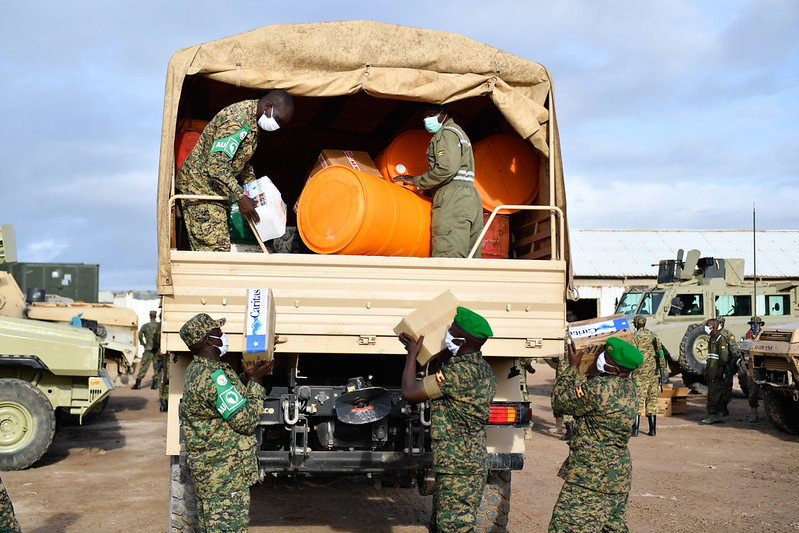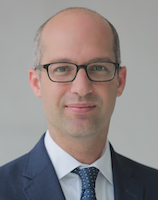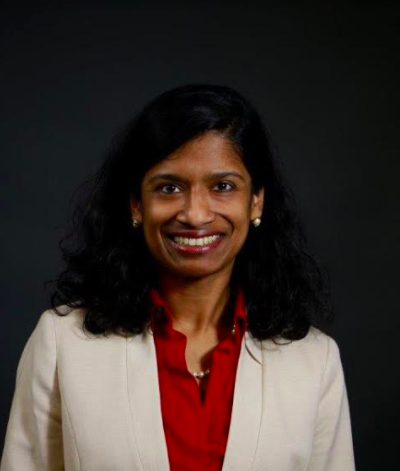A Strategic Framework to Improve Coronavirus Response in Africa
The response to the global pandemic by African countries and their external partners has been hampered by a lack of coordination. To streamline efforts to combat the coronavirus in Africa, the U.S. should consider exporting the “Quad Plus” framework used in the Indo-Pacific.

Published by The Lawfare Institute
in Cooperation With

The response to the global pandemic by African countries and their external partners has been hampered by a lack of coordination. As of late July, Africa has almost one million COVID-19 cases, accelerating rapidly after a slow start earlier in the year. The region is entering a recession for the first time in 25 years, and the pandemic has worsened conditions for some 670 million people who are already food insecure. African leaders have bristled at the inadequate support from the international community, denouncing the “selfishness on the part of industrialized nations” and arguing that its “external friends, if they are friends at all, should cancel all the multilateral and bilateral loans.”
Luckily, there is already a model available for how to improve coordination. The Quad dialogue—composed of the United States, India, Japan and Australia—is a geostrategic concept that has captivated significant attention in the Indo-Pacific region for over the past decade, and has recently been expanded to respond to the pandemic. The United States should consider exporting the framework to Africa as the continent, along with the rest of the world, grapples with COVID-19.
In the Indo-Pacific, the Quad has its origins in disaster response. In 2004, an earthquake struck the Indian Ocean and the resulting tsunami killed more than 200,000 people. Shortly afterwards, diplomats from the United States, India, Japan and Australia began to coordinate on the provision of disaster relief via military operations in the region. While this Tsunami Core Group was born out of crisis response to a non-traditional security threat and disbanded in 2005, the Quadrilateral Dialogue—or Quad—that emerged out of this disaster resembled a more traditional security formation.
By 2006, leaders from the four countries realized the power of building on their shared commitment to democratic values as well as the experience of coordinated military operations. This group saw its military apex during the September 2007 Malabar naval exercise in the Bay of Bengal, which included aircraft carriers from both the United States and India. China, however, sent demarches that year, criticizing this grouping as targeting Beijing.
The Quad grouping fell apart in 2008 due to a combination of domestic-level factors and insufficient strategic-level commitment. But discussions between the four countries were revived a decade later. With a focus on the reemergence of great power competition, U.S. leaders resumed Quad discussions in 2017 and upgraded them to the Secretary-of-State level in 2019. Building on this new set of Quad consultations, the United States began an effort in March 2020 to coordinate on the response to the coronavirus pandemic with its Indo-Pacific allies and partners. U.S. Deputy Secretary of State Steve Biegun convened a recurring meeting that has been unofficially termed a “Quad-Plus video-conference,” to discuss issues of cooperation such as “vaccine development, challenges of stranded citizens, assistance to countries in need and mitigating the impact on the global economy.”
Some observers have called this a “Quad Plus” framework because the participants extend beyond the U.S., India, Japan and Australia: South Korea, New Zealand and Vietnam have also participated. Most recently, Secretary of State Mike Pompeo met with counterparts from the four Quad countries, South Korea and the newest additions of Brazil and Israel in May 2020.
To be sure, there is some doubt about the effectiveness and staying power of this new grouping, considering pressing priorities other than Covid-19. Nonetheless, it represents a multilateral approach to the pandemic when the World Health Organization (WHO) has been sidelined and collective action is in short supply.
In contrast to the Indo-Pacific, there has been minimal coordination between African countries and external partners to manage the response to the global pandemic. The United States and China have received the most attention for their financial and medical support, but they are hardly alone. In addition to the United States and China, at least 20 countries, the European Union and private sector firms and foundations have provided assistance to African countries and the African Union. There is seemingly no rhyme or reason to these contributions; India delivered hydroxychloroquine to 25 countries, while Monaco issued personal protective equipment and groceries to Mali’s civil defense corps. The United States talks generically about its considerable financial support for “health assistance,” while the United Arab Emirates measures its medical assistance in metric tons.
This mishmash of contributions, however well-intentioned, is ineffective, leading to waste and mismanagement. It is hard to believe these aid packages are targeted and needs-based, especially when there is so little visibility across third-party contributions. At a time when the world’s largest government donors are buckling under the strain, it is unconscionable that there is no existing mechanism to coordinate international donor responses to the pandemic in Africa.
With this in mind, the utility of a Quad Plus model is evident. The continent’s 54 countries, as well as Western Sahara, are already leaning forward to coordinate a regional response to this health and economic crisis. The African Union (AU) has instituted a pooled procurement process for medical supplies and established a network of warehouses and distribution hubs to more effectively combat the virus’s spread. AU Chair (and South African President) Cyril Ramaphosa has assembled an all-star team to press the G20, the European Union and other international financial institutions to deliver “concrete support,” including a stimulus package, to assist the region’s fragile economies.
What is missing is coordination between Africans and their external partners, and it has not escaped the notice of many African leaders; in May, Ethiopian prime minister Abiy Ahmed insisted that life-and-death supplies, including PPE, testing kits and ventilators, be fairly distributed, “not hoarded by the rich and few.” A month later, Kenyan president Uhuru Kenyatta called for greater international cooperation in the face of coronavirus, stressing that “we need each other today more than we ever did.”
The main obstacle to replicating the Quad Plus model has been a lack of external leadership to partner with the AU and African governments. No country or institution, besides China and the WHO, has raised its hand to drive this process, convene key stakeholders and develop a framework for coordination. Africa’s leading partners, including existing Quad members India, Japan and the United States, could team up with the United Arab Emirates, the European Union and the international finance institutions, among others, to detail their past and future contributions to fight the pandemic. They could identify existing gaps and collaborate with the Africa Centres for Disease Control and Prevention to prioritize specific countries and sectors in dire need of assistance. This grouping, similar to the Quad-Plus video-conference, could convene regularly to update and adjust its response to meet evolving challenges.
The United States could and should play this role, as it has in past crises: In 2014-15, for example, the U.S. notably led the multilateral response to the Ebola crisis in West Africa. But Africa’s low prioritization under the Trump administration and the absence of a preexisting organizing concept, such as the Quad, has contributed to disappointing and often counterproductive U.S. leadership. President Trump attacked the WHO director-general (and former Ethiopian minister) Dr. Tedros Adhanom Ghebreyesus; Secretary of State Mike Pompeo chided South Africa for accepting Cuban medical support; and the U.S. Treasury has opposed special drawing rights allocations issued by the International Monetary Fund to countries seeking emergency assistance in responding to the economic crisis caused by the pandemic.
The United States, however, has plenty of experience with multilateral initiatives in the region. The United States, for example, is working with Gabon to co-chair the Friends of Gulf of Guinea, which includes 25 African, European and Asian countries, to promote commerce and freedom of navigation; strengthen marine ecosystems; and enhance maritime governance in the Gulf of Guinea region. And the response to Ebola also offers a precedent.
The Quad Plus Framework in the Indo-Pacific may be imperfect, but it offers a potential pathway to extend this multilateralist approach to U.S. foreign policy in Africa. And nowhere are the human and economic costs of a unilateral approach to the pandemic more severe than in Africa. African governments do not have the financial resources to weather this storm, and its healthcare systems, including some 10,000 doctors and nurses already inflicted with the virus, are ill-equipped to respond to long-term challenges posed by COVID-19. Without greater coordination, there is a risk of a mismanaged international response to this historic crisis. It could hinder the region’s ability to equitably distribute life-saving medical assistance and efficiently deliver a lifeline to economies ravaged by the pandemic.
Moreover, this lack of coordination leaves the field entirely to China, which has already hosted a China-Africa summit on the pandemic and benefits reputationally from the Jack Ma Foundation’s headline-grabbing shipments of medical equipment. The United States, which is neck-and-neck with China in terms of popularity in Africa, may struggle to persuade African countries to support U.S. positions against China in the U.N. and other global forums if the United States underperforms compared to China during Africa’s time of need.
The Quad Plus effort in the Indo-Pacific will be closely studied for how it handles the coronavirus crisis. Perhaps it may seem premature to recommend a Quad Plus model in Africa when that model remains untested in the Indo-Pacific. The consequences of inaction, however, are graver.






